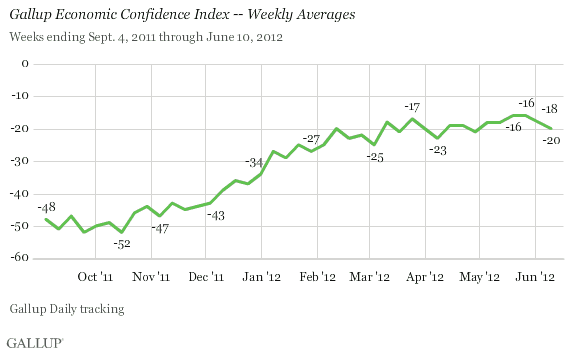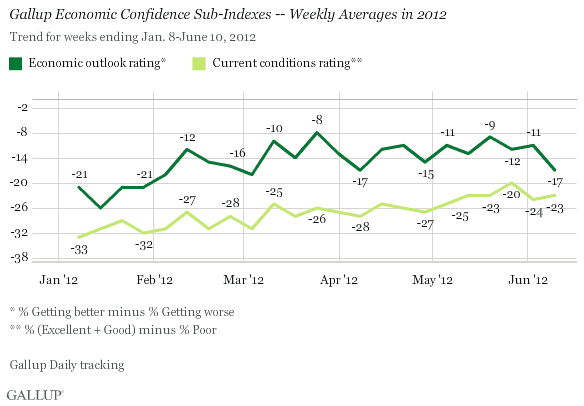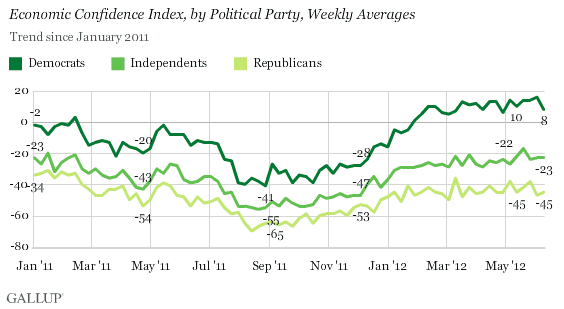WASHINGTON, D.C. -- Americans' confidence in the economy declined slightly last week, on the heels of a disappointing jobs report released by the Bureau of Labor Statistics. Gallup's Economic Confidence Index was -20 for the week ending June 10, down from -18 the prior week and a four-year best -16 the week before that. Still, economic confidence remains significantly better than in late 2011. Confidence at that time was rising as unemployment began steadily falling.

Economic confidence held steady at -17 June 1-3 after the June 1 jobs report and the year's worst day of trading, but slipped last week. However, concerns last week about the economic situation in Spain combined with perceptions of a sputtering U.S. jobs climate may have led to the slight pullback in confidence.
Economic Outlook Deteriorates
Gallup's Economic Confidence Index consists of two measures -- one assessing current economic conditions and the other assessing the nation's economic outlook. Americans were slightly more pessimistic about the economic outlook last week, while perceptions of current economic conditions were flat. The -17 economic outlook rating reflects a six-percentage-point decline over the previous week, with 39% of Americans saying the economy is getting better and 56% saying it is getting worse. Sixteen percent of Americans say the economy is excellent or good, while 39% consider it poor, resulting in a -23 current conditions rating.

Democrats' Confidence Drops
The decline in economic confidence last week was driven by Democrats, whose index score dropped eight points compared with the previous week, from 16 to 8. Republicans' confidence improved slightly to -45 and independents' was flat at -23. Still, Democrats continue to be significantly more confident in the economy than Republicans, and the decline last week in Democratic confidence did little to close the gap.

Bottom Line
Gallup's measure of economic confidence recently leveled off after months of steady improvement, and now appears to be retreating a bit. This mirrors the trend in the U.S. employment situation as reported by the U.S. Bureau of Labor Statistics. With the U.S. economy fragile and concerns over European debt continuing to mount, economic confidence will be an important number to watch in the coming weeks and months leading up to the presidential election. The continued negative confidence among independents is particularly relevant to President Obama's re-election hopes. Given that independents are the swing U.S. political group, confidence among them may need to move closer to positive territory to boost their willingness to back Obama in the election.
Gallup.com reports results from these indexes in daily, weekly, and monthly averages and in Gallup.com stories. Complete trend data are always available to view and export in the following charts:
Daily: Employment, Economic Confidence, Job Creation, Consumer Spending
Weekly: Employment, Economic Confidence, Job Creation, Consumer Spending
Read more about Gallup's economic measures.
View our economic release schedule.
Survey Methods
Results are based on telephone interviews conducted as part of Gallup Daily tracking from June 4-10, 2012, with a random sample of 3,456 adults, aged 18 and older, living in all 50 U.S. states and the District of Columbia, selected using random-digit-dial sampling.
For results based on the total sample of national adults, one can say with 95% confidence that the maximum margin of sampling error is ±2 percentage points.
Interviews are conducted with respondents on landline telephones and cellular phones, with interviews conducted in Spanish for respondents who are primarily Spanish-speaking. Each sample includes a minimum quota of 400 cell phone respondents and 600 landline respondents per 1,000 national adults, with additional minimum quotas among landline respondents by region. Landline telephone numbers are chosen at random among listed telephone numbers. Cell phone numbers are selected using random-digit-dial methods. Landline respondents are chosen at random within each household on the basis of which member had the most recent birthday.
Samples are weighted by gender, age, race, Hispanic ethnicity, education, region, adults in the household, and phone status (cell phone only/landline only/both, cell phone mostly, and having an unlisted landline number). Demographic weighting targets are based on the March 2011 Current Population Survey figures for the aged 18 and older non-institutionalized population living in U.S. telephone households. All reported margins of sampling error include the computed design effects for weighting and sample design.
In addition to sampling error, question wording and practical difficulties in conducting surveys can introduce error or bias into the findings of public opinion polls.
For more details on Gallup's polling methodology, visit www.gallup.com.
